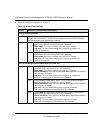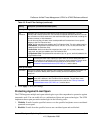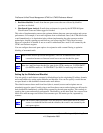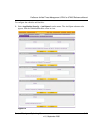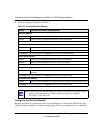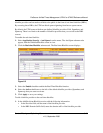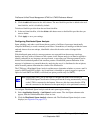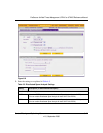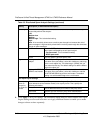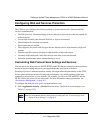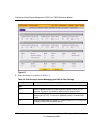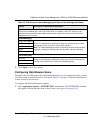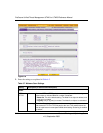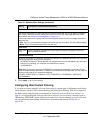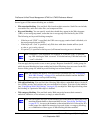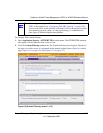
ProSecure Unified Threat Management UTM10 or UTM25 Reference Manual
6-18 Content Filtering and Optimizing Scans
v1.0, September 2009
4. Click Apply to save your settings. The Distributed Spam Analysis section and the Anti-Spam
Engine Settings section each have their own Apply and Reset buttons to enable you to make
changes to these sections separately.
Sensitivity From the Sensitivity pull-down menu, select the level of sensitivity for the anti-spam
engine that performs the analysis:
Low.
Medium-Low.
Medium.
Medium High. This is the default setting.
High.
Note: A low sensitivity allows more e-mails to pass through but increases the risk of
spam messages. A high sensitivity allows fewer e-mails to pass through but diminishes
the risk of spam messages.
Action SMTP From the SMTP pull-down menu, select the action that is taken
when spam is detected by the anti-spam engine:
• Tag spam email. This is the default setting.
• Block spam email.
POP3 The only option is to block spam e-mail.
Tag Add tag to mail
subject
When the option “Tag spam email” is selected from the Action
pull-down menu (see above), select this checkbox to add a tag
to the e-mail subject line. The default tag is “[SPAM]” but you
can customize this tag. The default setting is to add the default
tag to the subject line.
Add tag X-NETGEAR-
SPAM to mail header
When the option “Tag spam email” is selected from the Action
pull-down menu (see above), select this checkbox to add the
“X-NETGEAR-SPAM” tag to the e-mail header. The default
setting is to add the default tag to the e-mail header.
Anti-Spam Engine Settings
Use a proxy
server to
connect to
the Detection
Center
Select this checkbox if the UTM connects to the Netgear Spam Classification Center
(also referred to as the Detection Center) over a proxy server. Then, specify the
following information:
Proxy server
The IP address and the port number of the proxy server.
User name Optional: the user name for proxy server authentication.
Password Optional: The password for proxy server authentication.
Table 6-5. Distributed Spam Analysis Settings (continued)
Setting Description (or Subfield and Description)



